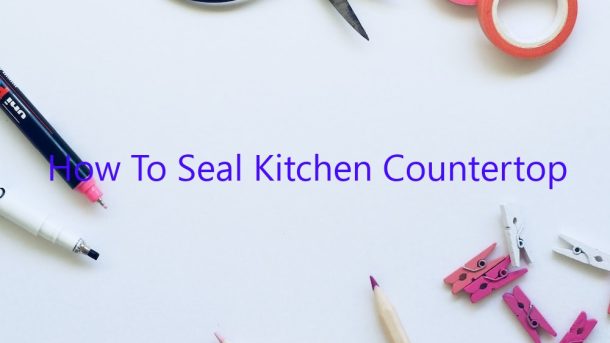A kitchen countertop is a workhorse in any kitchen. It needs to be durable and easy to clean. Over time, your countertop may start to show signs of wear and tear. Sealing your countertop can help protect it from everyday wear and tear and help keep it looking new for years to come.
There are a few different types of sealers you can use on your kitchen countertop. If you have a granite countertop, you can use a granite sealer. If you have a laminate countertop, you can use a laminate sealer. If you have a concrete countertop, you can use a concrete sealer.
Before you seal your countertop, you should clean it with a degreaser to remove any dirt or grease. Once it’s clean, you can apply the sealer with a brush, roller, or sprayer. You should allow the sealer to dry for 24 hours before using your countertop.
Sealing your countertop can help protect it from staining, etching, and fading. It can also help prevent the formation of mold and bacteria. Sealing your countertop is a quick and easy way to protect your investment and keep your kitchen looking new.
Contents
Should countertops be sealed?
Countertops are a big part of any kitchen or bathroom remodel. They are a focal point and need to be chosen carefully. One question people often ask is whether or not to seal their countertops.
There are a few factors to consider when deciding whether or not to seal your countertops. The first is the type of material your countertops are made of. Sealing is most important for natural stone countertops, such as granite or marble, as they are more porous and can easily absorb liquids and oils. Sealing will help protect them from staining and make them easier to clean.
If your countertops are made of a non-porous material, such as laminate or quartz, sealing them is not as important. However, it can still be a good idea to seal them to help protect them from scratches and stains.
The other important factor to consider is the type of sealant you use. There are many different types of sealants available, and not all of them are created equal. When choosing a sealant, be sure to read the label carefully to make sure it is made for your type of countertop material.
Once you have chosen the right sealant, be sure to follow the manufacturer’s instructions for application. Sealing your countertops can be a bit of a hassle, but it is definitely worth it in the end.
What do you seal a countertop with?
When selecting a sealant for your countertop, it is important to consider the type of material that it is made of. Different sealants work better on different materials. For example, if your countertop is made of granite, you will want to use a sealant that is specifically designed for granite.
There are a variety of sealants on the market, and each one has its own benefits and drawbacks. Some sealants are more durable than others, and some are more resistant to staining. It is important to read the labels of any sealants that you are considering using to make sure that they are suitable for your countertop material.
It is also important to note that not all sealants are created equal. Some sealants are designed for indoor use, while others are designed for outdoor use. Make sure you select the correct sealant for your needs.
If you are unsure which sealant to use, or if you have any other questions about sealing your countertop, please contact the manufacturer or a professional contractor.
Can I seal granite myself?
Sealing granite is a process that helps to protect it from staining and etching. While it is possible to seal granite yourself, it is important to make sure that you use the right products and follow the proper steps in order to achieve the best results.
There are a few things to keep in mind when sealing granite. First, make sure that the surface is clean and free of any dust or dirt. Second, be sure to use a product that is specifically designed for sealing granite. Many sealers are not suitable for use on granite, and can actually damage the surface.
The process of sealing granite usually involves applying the sealer to the surface with a cloth or sponge, and then buffing it in with a clean cloth. Be sure to read the instructions on the sealer product to make sure you are using it correctly.
It is important to note that granite does not need to be sealed on a regular basis. Sealing it only needs to be done when you notice that the surface is beginning to show signs of staining or etching.
If you are unsure of whether or not your granite needs to be sealed, or if you would like to have it sealed professionally, you can contact a granite installer or stone care specialist for more information.
What do you seal granite counter tops with?
Granite countertops are a popular choice for kitchen countertops because they are durable and easy to clean. However, they can be susceptible to staining, so it’s important to seal them to protect them from spills and other messes.
There are a variety of sealers available, and the best one for your countertops will depend on the type of granite and the finish you choose. There are sealers that are applied with a brush, sealers that are sprayed on, and sealers that are poured on.
Some sealers are available as a kit that includes the sealer and a special cleaner that is used to prep the countertops before sealing. Be sure to follow the manufacturer’s instructions for application, and allow the sealer to dry completely before using the countertops.
It’s important to seal granite countertops regularly, preferably every year or two, to keep them looking their best.
What countertops dont need sealing?
There are a few factors to consider when deciding whether or not to seal your countertops. The first consideration is the type of material your countertops are made of. Marble, granite, and quartz are all natural stones that are porous and will need to be sealed in order to prevent staining and water damage. Laminate countertops are made of plastic and do not need to be sealed. If your countertops are made of a man-made material, such as Corian or Silestone, it is best to consult the manufacturer to find out if they need to be sealed.
The second consideration is the level of use your countertops will see. If you only use your countertops for light tasks such as preparing food or doing homework, they likely do not need to be sealed. However, if you are using your countertops for heavy-duty tasks such as cooking or cleaning, it is best to seal them to prevent wear and tear.
The final consideration is the climate in which you live. If you live in a humid climate, it is best to seal your countertops to prevent moisture damage. However, if you live in a dry climate, sealing your countertops is not necessary.
Ultimately, the best way to determine whether or not your countertops need to be sealed is to consult the manufacturer or a professional.
How often should you reseal your countertops?
Countertops are a major feature in any kitchen. They can be a focal point of the room or simply a functional surface. Either way, it’s important to keep them in good condition. One way to do that is by resealing them on a regular basis. How often should you reseal your countertops, you ask?
It depends on the material of your countertops. If they’re made of granite or marble, you should reseal them every year. If they’re made of quartz, you should reseal them every two years. If they’re made of concrete, you should reseal them every three years.
It’s important to reseal your countertops because it keeps them looking new. It also protects them from staining and bacteria. Plus, it keeps them from absorbing food and liquids, which can cause bacteria to grow.
If you’re not sure how to reseal your countertops, there are plenty of tutorials online. You can also hire a professional to do it for you. Just make sure you do it on a regular basis to keep your countertops looking and functioning their best.
What happens if granite is not sealed?
Granite is a popular natural stone that is often used in countertops and flooring. It is known for its durability and beauty. Like any other natural stone, granite needs to be sealed in order to protect it from staining and etching. If granite is not sealed, it can become stained and etched.
Granite is a porous stone and it can absorb liquids and oils. If it is not sealed, these liquids can penetrate the surface and cause the granite to become stained. The stains can be difficult to remove and may require the use of a professional cleaning service.
Granite can also be etched if it is not sealed. Etching is a type of damage that occurs when the surface of the granite is attacked by a chemical. Etching can be a permanent damage and it can’t be repaired.
It is important to seal granite in order to protect it from staining and etching. Sealing granite is a simple process and it can be done by using a sealant or a penetrating sealer.




